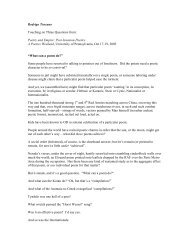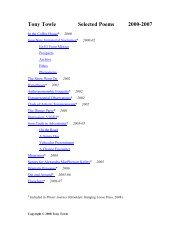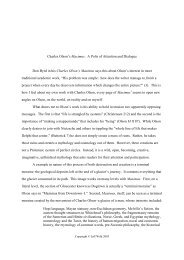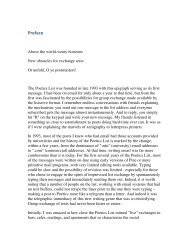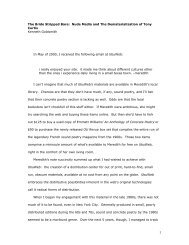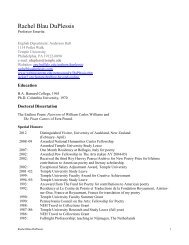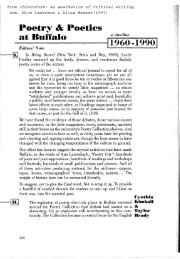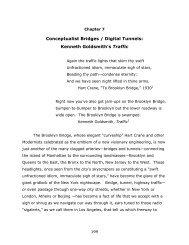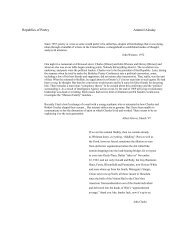P's and Q's of Poetry - Electronic Poetry Center
P's and Q's of Poetry - Electronic Poetry Center
P's and Q's of Poetry - Electronic Poetry Center
You also want an ePaper? Increase the reach of your titles
YUMPU automatically turns print PDFs into web optimized ePapers that Google loves.
DeMinter 3<br />
Goldsmith’s observation places poetry on the lowest spectrums <strong>of</strong> Francisco’ barometer <strong>and</strong> in<br />
clear congruence with Bok’s observation.<br />
Goldsmith’s statement that:<br />
<strong>Poetry</strong> generally is so <strong>of</strong>f the beaten track in this culture that if the producers <strong>of</strong> it<br />
don't set up the distribution channels, no one will. And since it lacks the capital<br />
<strong>and</strong> market <strong>of</strong> painting, it's <strong>of</strong> no use to museums who might actually be able to<br />
fund adventurous poetries which move along similar intellectual tracks as the art<br />
they're showing, (Belgium)<br />
imposes negation upon poetry if viewed from the capitalist mindset. In light <strong>of</strong> R<strong>and</strong>, poetry’s<br />
failed marketability is symptomatic <strong>of</strong> its remoteness from the capitalist ideals that influence<br />
mainstream society <strong>and</strong> furthermore serves as a denouncement by the masses <strong>of</strong> poetry’s societal<br />
value. An equally bleak image <strong>of</strong> the reception <strong>of</strong> poetry by the mainstream is found in Susan<br />
Stewart’s critical writing.<br />
Donald Wesling argues that Stewart’s <strong>Poetry</strong> <strong>and</strong> the Fate <strong>of</strong> the Sense, is a “struggle<br />
against loss through grief, prayer <strong>and</strong> ceremony, <strong>and</strong> the restitutions <strong>of</strong> art.” In her critical piece,<br />
Stewart charts the steady decline <strong>of</strong> the poetic practice <strong>and</strong> reception in contemporary culture.<br />
During a seminar lecture given at Georgetown University, Stewart commented that poetry is not<br />
as popular in contemporary times as it once was <strong>and</strong> it was struggling to keep up with new<br />
technologies, but the works <strong>of</strong> conceptual poets was not going to restore it.<br />
Despite Goldsmith <strong>and</strong> Stewart’s theoretical divergences on how to reconstitute poetry,<br />
their conclusions on the place <strong>of</strong> poetry in contemporary culture are the same: it lives on the<br />
outskirts <strong>of</strong> society beyond the interest <strong>of</strong> an increasingly capitalistic culture. The congruent<br />
perceptions <strong>of</strong> the conceptualist camps, as represented by Goldsmith, <strong>and</strong> more traditional poetic<br />
notions, as typified by Stewart, regarding the decline <strong>of</strong> poetry are enough to merit pause,<br />
especially on as important a conversation as the place <strong>of</strong> poetry in the contemporary l<strong>and</strong>scape.





